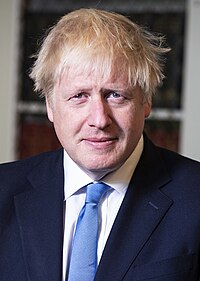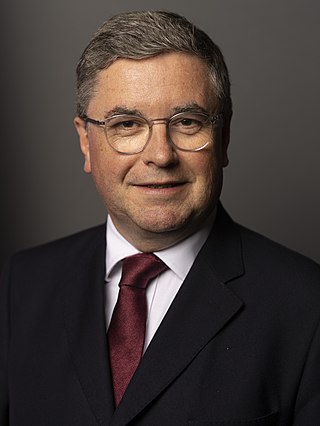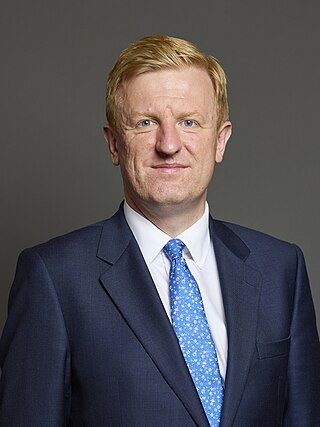
Boris Johnson carried out the second significant reshuffle of his majority government from 15 September to 18 September 2021, having last done so in February 2020.

Boris Johnson carried out the second significant reshuffle of his majority government from 15 September to 18 September 2021, having last done so in February 2020.
| Colour key |
|---|
|
| Colour key |
|---|
|

There had been growing speculation that Dominic Raab would be demoted from his position as Foreign Secretary, as a result of his handling of the Taliban offensive in August 2021. [11] On the day of the reshuffle, Raab met with the Prime Minister for a considerable length of time, having initially refused to leave the Foreign, Commonwealth and Development Office. The Financial Times reported that Raab was "throwing his toys out of [the] pram". Sources are alleged to have told Sky News that Raab was "very angry" at Johnson's decision to move him. [12] Eventually, Raab accepted his new position as Secretary of State for Justice and was given the additional role of Deputy Prime Minister, making him the first minister to hold the office since Nick Clegg during the Conservative–Liberal Democrat coalition (2010–2015). [13]
The appointment of Nadine Dorries as Culture Secretary was heavily criticised in the arts and culture sectors. [14] [15] Her promotion to the Cabinet was questioned due to her right-wing views and inexperience. [16] Dorries was dubbed by some as the new "Secretary of State for Culture Wars", with concerns raised about her extreme views on cultural issues. [17] [18] Following her appointment, the Broadcasting, Entertainment, Communications and Theatre Union called on the new minister to "focus more on supporting our cultural industries and less on stoking divisive culture wars". [19]
After Robert Buckland was dismissed as Secretary of State for Justice and replaced by Dominic Raab, there was some criticism from Sir Bob Neill, chairman of the Justice Select Committee. Neill told Sky News that removing Buckland from his position was "unjust, outrageous" and that he had been "shabbily treated" by Johnson. [20] Derek Sweeting, chairman of the Bar Council, appeared to criticise the turnover of justice secretaries, stating: "As we welcome the eighth justice secretary in the last 10 years to play this vital role, the need for a consistent and strong voice in government for our justice system could not be greater". [21]
Alix Culbertson wrote that Gavin Williamson's sacking was of "little surprise" following his handling of GCSE grades. [22] He was also criticised for confusing rugby player Maro Itoje with Marcus Rashford. [23] Wes Streeting responded to reports that Williamson had been ‘tipped for knighthood’ saying "there should be no rewards for failure." [24] On 24 September 2021, Williamson unfollowed Boris Johnson on Instagram. [25]
In December 2021, Wendy Morton and Chris Heaton-Harris swapped ministerial jobs (Minister of State for Europe and Minister of State for Transport). [26]

Nadine Vanessa Dorries is a British author and a former politician who served as Secretary of State for Digital, Culture, Media and Sport from 2021 to 2022. She was Member of Parliament (MP) for Mid Bedfordshire from 2005 to 2023 for the Conservative Party.

The Minister of State for Europe, North America and Overseas Territories, is a ministerial position within the Government of the United Kingdom, in charge of affairs with Europe. The Minister can also be responsible for government policy towards European security; defence and international security; the Falkland Islands; polar regions; migration; protocol; human resources; OSCE and Council of Europe; relations with Parliament; British Overseas Territories of Gibraltar and Sovereign Base Areas in Cyprus; and FCO finance, knowledge and technology.

The Ministry of Housing, Communities and Local Government (MHCLG) is a ministerial department of the Government of the United Kingdom. It is responsible for housing, communities, and local government in England. It was established in May 2006 and is the successor to the Office of the Deputy Prime Minister, established in 2001. The department shares its headquarters building, at 2 Marsham Street in London, with the Home Office.

Dominic Rennie Raab is a British former politician who served as Deputy Prime Minister of the United Kingdom, Justice Secretary and Lord Chancellor from September 2021 to September 2022 and again from October 2022 to April 2023. He previously served as First Secretary of State and Foreign Secretary from 2019 to 2021. A member of the Conservative Party, Raab was Member of Parliament (MP) for Esher and Walton from 2010 to 2024.

Sir Robert James Buckland is a British politician who served as Lord Chancellor and Secretary of State for Justice from 2019 to 2021, and as Secretary of State for Wales from July to October 2022. A member of the Conservative Party, he was first elected as the member of Parliament (MP) for South Swindon in 2010, holding the seat until the 2024 general election.

Michelle Emma May Elizabeth Donelan is a British politician who previously served as Secretary of State for Science, Innovation and Technology from July 2023 to July 2024, having previously served in the position from February to April 2023 before being temporarily replaced during her maternity leave.

Wendy Morton is a British Conservative Party politician who has been the Member of Parliament (MP) for Aldridge-Brownhills since 2015. She served as Chief Whip of the House of Commons and Parliamentary Secretary to the Treasury from September to October 2022.

Sir Oliver James Dowden, is a British Conservative Party politician who has been the Member of Parliament (MP) for Hertsmere since 2015. He has served as Deputy Leader of the Opposition and Shadow Chancellor of the Duchy of Lancaster since July 2024. He served as Deputy Prime Minister of the United Kingdom and Secretary of State in the Cabinet Office from 2023 to 2024 and as Chancellor of the Duchy of Lancaster from 2022 to 2024.

The second May ministry was formed on 11 June 2017 after Theresa May returned to office following the June 2017 snap general election. The election resulted in a hung parliament with the Conservative Party losing its governing majority in the House of Commons. On 9 June 2017, May announced her intention to form a Conservative minority government, reliant on the confidence and supply of the Democratic Unionist Party; a finalised agreement between the two parties was signed and published on 26 June 2017.

Theresa May carried out the first reshuffle of her minority government in January 2018. Following the resignation of her deputy, Damian Green as First Secretary of State in December 2017, the reshuffle had been highly anticipated and briefed in the press. There were reports of "up to a quarter" of her cabinet ministers who might lose their positions, including Boris Johnson, who had been seen to cause a number of political gaffes during his term as Foreign Secretary. The reshuffle was seen as an opportunity for May to reassert authority, greatly diminished following the result of the snap general election the previous year. Despite being described by 10 Downing Street as a chance to "refresh" the Cabinet, few changes were made to the ministerial line-up. On 9 January, newspaper headlines reflected the chaotic nature of May's reshuffle, with The Daily Telegraph describing it as, "The Night of the Blunt Stiletto", a reference to the 1962 reshuffle carried out by Harold Macmillan.

The first Johnson ministry began on 24 July 2019 when Queen Elizabeth II invited Boris Johnson to form a new government, following the resignation of the predecessor Prime Minister Theresa May. May had resigned as Leader of the Conservative Party on 7 June 2019; Johnson was elected as her successor on 23 July 2019. The Johnson ministry was formed from the 57th Parliament of the United Kingdom, as a Conservative minority government. It lost its working majority on 3 September 2019 when Tory MP Phillip Lee crossed the floor to the Liberal Democrats. An election was called for 12 December 2019, which led to the formation of a Conservative majority government, the second Johnson ministry.

The second Johnson ministry began on 16 December 2019, three days after Boris Johnson's audience with Queen Elizabeth II where she invited him to form a new government following the 2019 general election. The Conservative Party was returned to power with a majority of 80 seats in the House of Commons. Initially the ministers were largely identical to those at the end of the first Johnson ministry, but changed significantly in cabinet reshuffles in February 2020 and September 2021.

Boris Johnson carried out the first significant reshuffle of his majority government on 13 February 2020. Following the December 2019 general election, there was considerable speculation that Johnson was planning a major reshuffle of the Cabinet, to take place after the United Kingdom's official withdrawal from the European Union on 31 January 2020. There were reports that up to a third of the Cabinet would be dismissed, Whitehall departments abolished and civil servants replaced by policy experts; however, the reshuffle was smaller than expected and no departments were abolished. The anticipated reshuffle was nicknamed "The St Valentine's Day Massacre" in the press, due to its proximity to St Valentine's Day, the name being a reference to the 1929 gangland shooting in Chicago.

The Parliamentary Under-Secretary of State for Mental Health and Women's Health Strategy is a ministerial position within the Government of the United Kingdom, in charge of mental health and women's health policy.

Boris Johnson carried out the third significant reshuffle of his majority government from 5 to 8 July 2022, having last done so in September 2021. This was a direct result of the July 2022 United Kingdom government crisis in which more than a third of ministers and parliamentary private secretaries resigned from their positions.

In early July 2022, 62 of the United Kingdom's 179 government ministers, parliamentary private secretaries, trade envoys, and party vice-chairmen resigned from their positions in the second administration formed by Boris Johnson as Prime Minister, culminating in Johnson's resignation on 7 July. Johnson's premiership had been considered in danger for months after several scandals, but it was the Chris Pincher scandal that was identified to have spurred on the resignations. Considered the "last straw" for the Prime Minister, the scandal arose after it was revealed that Johnson had promoted his Deputy Chief Government Whip Chris Pincher, who was publicly facing multiple allegations of sexual assault, to the position despite knowing of the allegations beforehand.

The Sunak ministry began on 25 October 2022 when Rishi Sunak was invited by King Charles III to succeed Liz Truss as prime minister of the United Kingdom. Truss resigned as leader of the Conservative Party the previous day after Sunak was elected unopposed as her successor. The Sunak ministry was formed from the 2019 Parliament of the United Kingdom, as a Conservative majority government. Sunak reshuffled his cabinet twice, first in February 2023 and later in November 2023.

The Minister of State for Care and Mental Health was a ministerial position within the Government of the United Kingdom, in charge of mental health and social care policy.